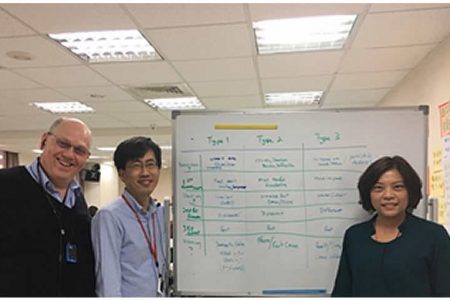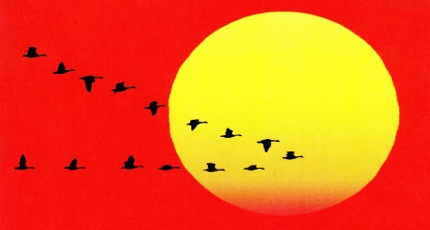The Courage to Lead’s Global Inspiration
ICA Taiwan Take on the Courage to Lead Study

The Courage to Lead book and course has been a source of inspiration and challenge been for groups, not only in Canada but also abroad. Jorie Wu, from the ICA Taiwan office was excited to share with us her experience with a study group on the Courage to Lead! Jorie and her husband led the discussion and a resultant newsletter (below) on the social pioneer chapter!“
“Social Pioneers Then and Now”
Written by George Yen, Chairman , Jorie Wu, Director of CP Yen Foundation
“Many of us can master techniques. But transformative leadership which releases the spirit and possibilities of the group and individuals we serve is more than techniques. It is about how we show up, what we value, our relationship to our work and life.” (Jane Stallman, Founder and Senior Partner for Strategic Facilitation)
“Reading The Courage to Lead, and participating in the course first as a student then as a facilitator, makes me realise that I can create positive change in the world any time, on a large or small scale – and that in fact I already do – simply by relating authentically to myself, to all parts of life, and to everyone I meet along the journey.” (Sara B., University Health Network)
“I definitely look at problem-solving in a new way, instead of just working to change everything, I have new insights on what makes a great leader.” (Anonymous)
In The Courage to Lead, leadership means a role that someone assumes, with or without a specific title or position. We can all be leaders in our life and in society.
Social pioneers are people who pioneer positive change in society. They address major social concerns, based on their every day care. The task of social pioneers is to create positive change in structures and people’s life.

Social pioneers attempt to move society forward without confrontation or agitation, but through engaging people in a consensual understanding about what is necessary. They often put themselves at the leading edge of a wedge, working between no longer and not yet. Many NGOs are social pioneers; attempt to move society out of what is no longer working, forward to somewhere that is not yet existing , an ideal place. Social pioneers are creating history “between what is no longer and the not yet”.
In the ICA book study group led by Larry Philbrook, it occurred to us that the CPYF (Chao Pan Yen Foundation) has been a social pioneer through most of its 18 year history. Its tools to facilitate positive changes are facilitation and dialogue learned from ICA Taiwan and others.
Almost from the beginning, CPYF, being a non-profit organization, chose to differentiate from the more profitable corporate market and focus on the less well-served public sectors of governments and NGO/NPOs. In the early years, it honed its skills and builds its capacity through a series of “Imagine Taiwan” – a social dialogue program in Taichung, Kaoshiung, Hualien, as well as Taipei. Over time CPYF was able to build a team of practitioners of the craft and became a platform for positive social change in organizations through dialogues. In the hierarchical organizations in Taiwan, genuine dialogue goes against the traditional cultural grain. Once discovered and internalized, dialogue became a powerful strategy for organizational change. Hopefully over time and cumulatively, these individual, organizational cultural changes became the building blocks of positive social change.
“Imagine Taiwan” series was done in 2007 at a time of social and political turmoil during the final years of the disgraced President Chen Sui Bien and the Red Shirts protest movement. Community dialogue through “Imagine Taiwan” was an attempt to shift the division in society to positive social change through dialogue. As the Persian poet, Rumi so aptly wrote, “Beyond the realms of right and wrong there is a field. I will meet you there.” That field is the space of dialogue where people can listen before judgement.
Last year in 2016, CPYF was a strategic partner in a program “Dialogue With Time”. In the face of Taiwan’s rapidly aging society, the program aims to promote active aging, by training retired elderly volunteers to engage in society. The project touches two levels of social meaning (1) It advocates an active and positive attitude toward aging, (2) It generates cross generational dialogue in the society. CPYF was therefore awarded by 2016 Facilitation Impact Award- Gold by International Association of Facilitators.
It is in this reflection of The Courage To Lead, and the mission of CPYF that we came to see that foundation is continuing the mission of social change of my father Yen Chao Pan, for whom the foundation is named after. He and the educated elites of his time had lived the life of social pioneers in the pivotal period of Taiwan’s history as it bridges the Japanese to the KMT era in the half century bracketing World War II. It was also a time that Taiwan made the transition from an agricultural society to an industrial one and which in turn laid the foundation for today’s high-tech industry.
As a member of the small, educated elite of that time, they took it upon themselves to be social pioneers charged with the responsibility of creating positive social change. It is important to note that native Taiwanese of that era, both under the Japanese and the KMT rule, were restricted from participating in politics and government as means social change. The only avenues for the educated elites of that time were in non-threatening fields of medicine, engineering and agriculture. In such restrictive time, they see it as their responsibility to lead in Taiwan’s “what is not longer and that which is not yet”.
The vehicle for them was an NGO, “The Taiwan Association for the Advancement of Science” which was established in 1930 with the aim of promoting positive social change through science and technology. The founder is a Dr. Tu Tsong Ming, the first Taiwanese medical doctor and recognized as the father of modern medicine in Taiwan. He also founded Taiwan Medical Association in 1902 and was an authority of world repute on tropical diseases. Dr. Tu married a member of the Yen family and is therefore considered a relative. My father was inspired by Dr. Tu’s vision to modernize Taiwan and devoted 50 years of his life in this pursuit. As a professional electrical engineer born in 1918, he served as the Chief Editor of its publication “Formosan Science” since its debut in 1947 at the age of 29 and its President from 1990 until his death in 1995.
1947 was a dangerous time for the educated elite as it was the year of the “February 28 incident” when thousands of such elites were killed by the KMT soldiers. In the decades that followed that regrettable episode, native Taiwanese were treated with suspicion by the Chiang Kai-shek government. Paths to join in the establishment as “pro-establishment” were limited.
“Disestablishment”, on the other hand, means to stand in opposition to the KMT government that was in full retreat from Mao in mainland China. It was a chaotic time of paranoia and politics is something to avoid all together. The only avenue for the educated elite who want to play a role in the change process in Taiwan was “trans-establishment”. It was the third pole in this triangle of “Pro-establishment—Disestablishment and Transestablishment. The Courage To Lead said it well, “While the disestablishment and pro-establishment argue over the shape of the present or the past, the trans-establishment asks the futuristic questions on behalf of everyone else, dares to imagine something different.”
It is quite clear that the NGO, “The Taiwan Association for the Advancement of Science” was their only means of bringing about social change without getting into trouble with the prevailing power of that time. Transestablishment is the only viable avenue for social progress. Brian Stanfield noted, “A key method of transestablishment leadership is framing, or networking to establish support and authorization for a change project.” Or, as an Indian proverb so aptly puts it, “If you live in the river, you should make friends with the crocodile.”
So it is more in hindsight than in foresight, that the CP Yen Foundation, is carrying on the vision of its namesake—creating positive social change, albeit by a different avenue. The Courage to Lead provides an excellent framework that helps us understand what we have been doing for two generations in Taiwan—the transformation of society through the transformation of self.
Anyone can be a social pioneer. You don’t need to establish a foundation or an organization to make social change. You could start with small project, such as share left over with people who need it , start a community garden to keep aging people active
When you are pioneering social change, you might be facing challenges such as how to create innovative solution, how to encourage and inspire others to be on the journey of social pioneers and at the same time how to take care of yourself; because social pioneering is a continuous commitment.
It is with this article, we salute to social pioneers then and now, who continuously struggle between the space of < no longer and not yet>, moving the society forward in transestablishment.
Note 1: “Courage to Lead” by R. Brian Stanfield, published by The Canadian Institute of Cultural Affairs
Note 2: This article is based on the reflection of “Courage to Lead”, Chapter 7 &8, Section C: Relation to Society


